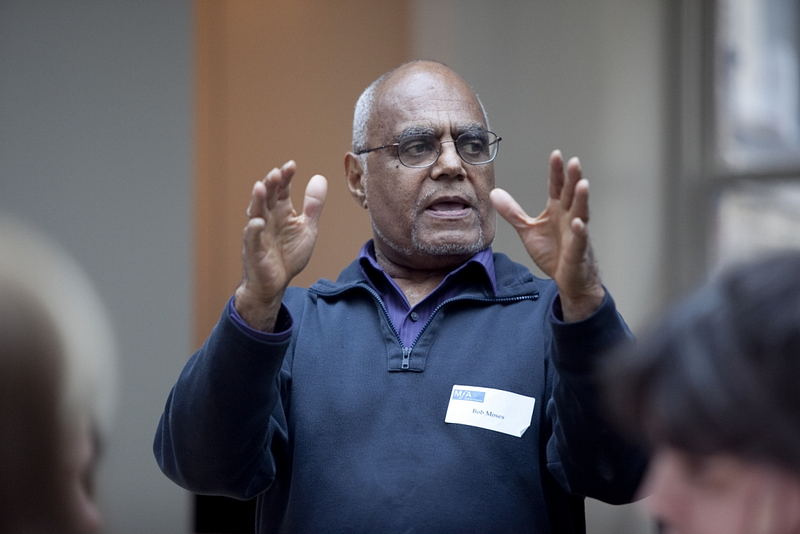
At 4 PM on Wednesday, Feb. 20 in the Kennedy Auditorium, Taylor Science Center, Robert Moses ’56 returned to the Hill to discuss his work as a leader in the civil rights movement and his efforts to address issues of inequality within the American education system. The Days-Massolo Center (DMC) recognized Moses, a MacArthur “Genius” Fellow, for his role as President and Founder of The Algebra Project, whose mission is to guarantee quality public school education for all children in the United States through the use of mathematics literacy as an organized tool.
Prior to delving into his work with the Project, Moses spoke about his involvement in the civil rights movement after graduating from Hamilton with a B.A. in philosophy.
In southern Mississippi, he organized groups of sharecroppers to work on specific issues that he believed needed to be addressed amongst that community. The activists began to focus voting rights as they pertained to literacy.
Moses recalled a federal district judge asking him, “Why are you taking illiterates down to vote?” In his lecture, Moses said this question led him to examine what it means to be a citizen of the nation as opposed to what it means to be a citizen of the state.
In distinguishing the two, he discussed how, although citizens are granted the constitutional right to vote, not all citizens know how to properly exercise that right. With this idea in mind, he aimed to increase political access for African-Americans.
Connecting his work in this movement with the Algebra Project, Moses began with the general idea that national citizenship is “substantive” and began to concern himself with how language influences theory, logic, and arithmetic, subsequently altering mathematics within classrooms to focus more on the students themselves.
When asked about his approach as a leader of these movements, Moses said he prefers to step away from the spotlight and allow for the movements to orchestrate themselves without significant influence from the older generations. He told the audience that if one is working as an organizer within civil rights projects, “you’re organizing to help something come into being that you’re not going to be the leader of.”
He used his time working with the Mississippi Freedom Democratic Party (MFDP) as an example. During his time with the MFDP, a group organized in 1964 during the civil rights movement, Moses refused to have his picture taken and urged the media to photograph the locals instead.
Avoiding the spotlight and allowing affected parties to organize themselves has been a continuous theme of Moses’s work.
In the summer of 1995, The Algebra Project developed a space for young people to participate in mathematics literacy. Moses said the adults involved in the Project worked to allow the youth to organize independently. Given this freedom, Moses said the young people developed an initiative to teach middle school teachers how to use graphing calculators. The Project’s goals include developing a national alliance, recruiting interested students, expanding access to its programs to students in need.
Moses described the education system within the United States as a “caste system,” specifically referencing the Scholastic Aptitude Test (SAT) as an intelligence barometer for elite higher education institutions to admit public school students. In his efforts with The Algebra Project, he says he hopes to give students the opportunity to think in their own language and transform it into a symbolic language in concepts like mathematical variables.
Moses led a demonstration in which he asked two volunteers to join him at the front of the room and introduce themselves. He then asked the audience which of the volunteers they believed was taller. This information was encoded within the sentence as: “This participant is taller than that participant.” Moses hoped to show the difficulty in translating a phrase like this into mathematics because it deals with the most obvious features of our experiences. The purpose of the demonstration captured a pressing issue that The Algebra Project continues to address: whether or not there are math experiences that can be embedded in the students’ own language.
Moses explained that it can be difficult to find a school system that provides assistance for children who are failing on state tests. He connected this reality to the idea of the caste system referenced earlier.
Moses then addressed the students in attendance and asked them to think about the role they play in activism, using the Preamble of the United States Constitution as a framework. Specifically, the Preamble marks the United States as a home with open access to political engagement and discussions. Referencing the Dred Scott v. Sandford decision of 1857, Moses commented, “Africans were not a part of the political community.”
He added that the United States has always struggled with undocumented populations and that this is not a new development. He said that today’s youth — the current generation in college and entering college — will be tasked with addressing important problems.
Concluding the talk, he said Generation Z will be “faced with a deep-rooted contested issue about whether or not they are going to embrace the preamble and open up and move the country in a place where they can revisit the constitution and think about what they want in the constitution going forward.”

















